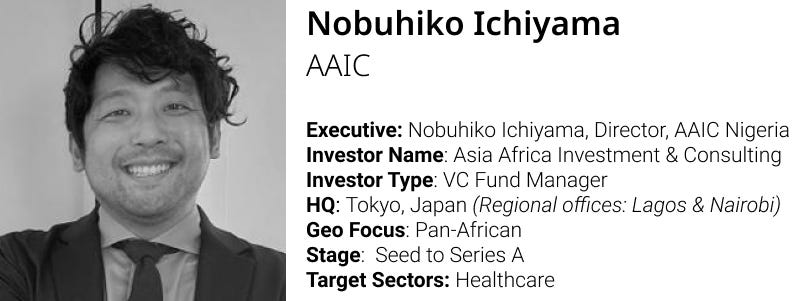The bridge to Japan: How AAIC went from macadamias to medicine
A profile of Asia Africa Investment & Consulting, a healthcare-focused early-stage investor whose investments span all four corners of the continent and include Chipper Cash, Kobo360, & Helium Health
Afridigest provides ideas & analysis for startup founders, operators, and investors across Africa and beyond.
Thanks to your feedback via the survey, we’ll be featuring more insights from practitioners across Africa’s startup ecosystem going forward. Here’s an interview with an active investor that offers first-hand examples of investment strategies in action and opportunities & challenges across regions.
If you’re new, welcome 🙌 — you’ll receive a weekly digest of what happened in the prior week every Monday and you’ll generally receive an original essay like this one on Saturdays. For past essays and digests, visit the archive.
Asia Africa Investment & Consulting (AAIC), a specialist Japanese firm, is among the international investors active in Africa’s startup ecosystem. The firm focuses on innovation in Africa’s healthcare sector and counts among its investments an ambulance dispatch platform, an insurance API provider, teleradiology & telemedicine platforms, dialysis centers & maternity hospitals, healthcare e-commerce marketplaces, a cross-border fintech, a healthcare booking platform, and tech-enabled logistics & mobility providers.
This author is fortunate to have interviewed Nobuhiko Ichiyama, the firm’s Director in Nigeria, about the investment environment across Africa, the drivers of Japanese interest in African startups, the impact of COVID-19 on the continent’s health-techs, and more. (Responses have been mildly edited for clarity.)
Hi Nobu. Thanks for taking the time to do this interview. First, can you tell us about AAIC and how things have evolved over the years?
AAIC Group (AAIC) aims to create new value by leveraging Japan’s competitive assets in fast-growing emerging markets. The group has two business arms, investment management and strategic consulting, and has been conducting business in Africa since 2010.
AAIC’s investment management arm currently manages the Africa Healthcare Fund (AHF), an investment vehicle focused on the African healthcare industry. Since the first close of the fund in 2017, AAIC has invested in over 25 innovative startup companies operating across 13 African countries, including many notable tech-enabled health-related startups via AHF.
AHF invests mainly in startups that are between Seed and Series A; we help our portfolio companies grow and expand by fully utilizing our international resources and network both across the continent and overseas.
AAIC’s other business arm, which focuses on strategic consulting, supports Japanese companies and government agencies with various business development activities in emerging markets, ranging from feasibility studies to market research and the development & implementation of market entry strategies.
For example, our strategic consulting arm provides start-up acceleration services in Uganda to JICA, the Japan International Cooperation Agency. With the knowledge and experience gained through our investment management arm, AAIC is able to offer high-value insights into the startup ecosystem in Uganda to inform JICA’s various innovation offerings for early-stage Ugandan startups.
Tell us about your first deal in Africa.
The first AAIC deal on the continent was actually an investment into the Rwanda Nut Company, a Kigali-based company producing and processing macadamia nuts on 300 hectares at the time. We now see more and more people becoming aware of this agribusiness opportunity that we saw a decade or so ago.
That’s so interesting. How have things changed from that first agribusiness investment to your most recent investment in Lami, the Kenyan API-driven insurance platform? How would you describe the investment environment in Africa today as compared to when you first started?



